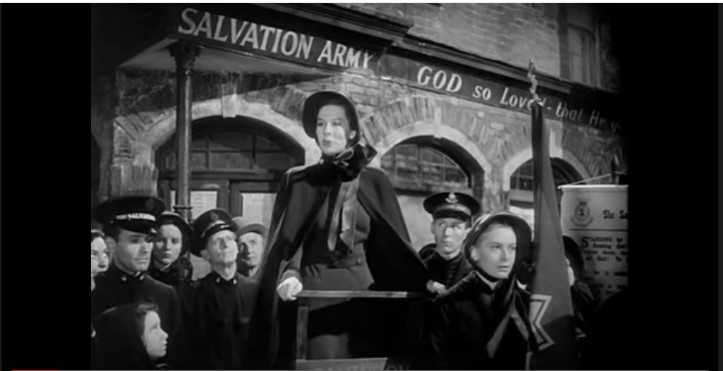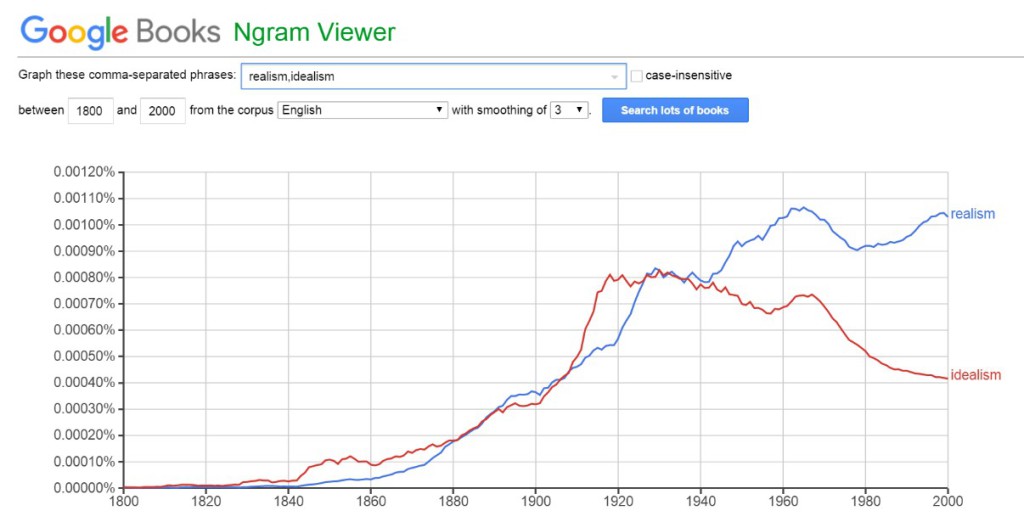In this post, Nicola Isaacs, who took the ‘Philosophical Britain‘ module at Queen Mary in 2015, writes about ‘Idealism’ as a philosophical keyword.
There is no term so vague as Idealism. No satisfactory definition of the word has ever been made; because since Plato and Aristotle wrote, hundreds of writers on Metaphysics and Philosophy have handled the subject of Idealism in Life and Art and so enmeshed and obscured the matter, that it is of no practical use for the layman to wade through the oceans of speculative and transcendental writing on the subject.[1]
These are the words of Frederick Wellington Ruckstuhl from an article dating back to January 1917. We can infer that Idealism has always been exceedingly difficult to describe, thus, many academic texts on this topic have always confronted the study with a pessimistic attitude. I fear that any attempts to discern a definition, unavoidably begins on a negative footing.
In the above quotation Ruckstuhl alludes to Idealism’s philosophical roots in Platonic thought. It is frequently referred to in this domain as ‘an eternally existing pattern of which individual things in any class are imperfect copies.’[2] It is here which marks the beginning of a turbulent chronology in philosophical thought however its etymological base ‘idein’ literally translates as ‘to see’ – whilst this definition is somewhat useful provides a comprehensive view of what idealism is; it simultaneously encompasses a wide scope of sub-contexts and divisions which cannot be defined so simply.
Idealism has innumerable connotations and departs into many different avenues. Searches offer a broad spectrum of results amongst which include more of the popular idealisms, such as transcendental, pragmatic, Kant and Collingwood; but also listed are less familiar concepts, like crazy Idealism, Buddhist practices such as Yogācāra Idealism, or one article by journalist Alan W. Down, examining Muscular Idealism – the notion of promoting peace in Middle East by using military power – not a vigorous fitness regime. From this selection of search results, it is clear that defining the term by any means of precision proves to be problematic, however in spite of this some commendable attempts have been made. In an article written in 1933, Edgar Sheffield Brightman alludes to this predicament, writing:
Whatever be the reasons for hostility to the definition and use of terms descriptive of philosophical systems, it has had undesirable consequences. It has tended to aid and abet the fiction that we have reached a point where there are no fundamental differences among systems or “schools” of philosophy. It has encouraged each philosopher to entertain the delusion that the implicit (nameless) system which he holds is the only truth, or (worse still) is so original and so genuinely unique that it cannot be related by any conceptual definition to any other system. (That way lies madness.) It has fostered the disintegrating belief that no system is worthy of attention and that philosophy consists solely of specialized problems.[3]
This quote of Brightman’s summarises the ambiguities of Idealism well. There is a plethora of persuasive arguments from different individuals within different schools convincing us that their concept of the term is correct. However one of the most notable is German Idealism.
In a general sense, Immanuel Kant is recognised as the personification of German idealism. Nonetheless, there are factions within this school, Kant is principally associated with the branch of Transcendental idealism. Philosopher and theologian Keith Ward gives a lecture detailing Kantian ethics, he claims that, ‘Kant’s proposed solution of polarities is at the heart of his Critical philosophy. It is the doctrine of Transcendental Idealism.’[4] Transcendental Idealism is the postulation of a reality without any sensory experience. Robin G. Collingwood resents the notion of Idealism as intrinsically German, and divorces the two in his work, often justifying Idealism’s separate identity.
It is Collingwood who is most often associated British idealism and who denounces the realists most emphatically. However recent commentaries challenge this stereotype, James Connelly questions whether Collingwood should be labelled an Idealist; he makes the suggestion his persona mirrors the complications of the term, in that both Collingwood and Idealism both deny any certified definition. To elaborate, Connelly observes: ‘The key to Collingwood’s Autobiography lies in what he opposed. He opposed realists and said so.’[5] In fact, more often than not, it seems that idealism is defined by what it is not, rather than what it is. In this respect, it is realism which is its antithesis. Whilst featuring heavily in philosophical spheres; this juxtaposition – between Idealism and Realism – can, too, be identified in the literary realm.
In 1925, George Bernard Shaw won the Nobel Prize in Literature ‘for his work which is marked by both idealism and humanity. Its stimulating satire often being infused with a singular poetic beauty.’[6] In his 1891 essay The Quintessence of Ibsenism he argues that society constitutes of three discrete types of people: philistines, who have no capacity for creative thought; idealists, who believe in the tangibility of the impossible; and realists, who can see the world for what it is.[7] His 1905 play, Major Barbara is representative of his personal philosophy, conflicting religious idealism against pragmatic realism within a single family unit, the play demonstrates that neither extreme is viable, for idealists often do not accomplish anything, and realists are too concerned with the practical.

Here is an image of Wendy Hiller from the 1941 film Major Barbara. Bernard Shaw helped write the screenplay. The link – see bibliography -shows a short clip of Barbara giving her most famous speech.
In his text The Sources of Idealism Shaw grapples with the idealism-realism dichotomy again. He writes:
[…] the two cannot agree. The idealist says, “Realism means egotism; and egotism means depravity.” The realist declares that when a man abnegates, the will to live and be free in a world of the living, and free, seeking only to conform to ideals for the sake of being, not himself, but “a good man,” then he is morally dead and rotten, and must be left unheeded to abide his resurrection, if that by good luck arrive before his bodily death. Unfortunately, this is the sort of speech that nobody but a realist understands. It will be more amusing as well as more convincing to take an actual example of an idealist criticising a realist.[8]
Following this argument, Keith Ward delivers another insightful lecture uncovering the meaning of this final sentence. An Idealist View of Reality explores the origins of Idealism, which Ward explains is typified by British idealist Bishop George Berkeley. In simple terms, Berkeley posits the idea that reality consists exclusively of minds and their ideas.[9] Ward expands upon this, commentating that ‘Idealists do not deny reality-in-itself – this is one prevalent misunderstanding of Berkeley- Idealists say that what we call the material or physical is a set of appearances that exist as we see them only in human minds. Whatever it is that appears, it is not identical with appearances. Therefore reality-in-itself is not physical. What we call the physical is in fact mind-dependent.’[10]
Realism was not Idealism’s only enemy. Stefan Collini in his article Idealism and ‘Cambridge Idealism’ surveys that, alike German Idealism, the British context of the nineteenth century witnessed tempestuous disputes between scholars. Collini records a certain spat between two Oxbridge academics. The quarrel saw accusatory insults denouncing each other’s theses as ‘dogmatic’, ‘vehemently propagandist’ and ‘superficial and sometimes even unintelligent.’[11]

A Google Ngram Viewer graph showing the divergence of frequency of use between ‘realism’ and ‘idealism’ since the 1940s.
In Britain, popular perceptions of Idealism reserve the term for dreamers, futurists and the impractical, whereas, it is generally argued that Realists are pragmatic, resourceful and sane. Figures show that the uses of the two terms have always shared similar trends, however, since 1945, Realism has ascended on the scale, whilst Idealism has declined.[12] Yet, it should be noted that data such as this, does not provide the context in which the terms are located. So, whether we are a nation of practicality, or a nation of dreamers, is a question that remains unanswered, and – perhaps thankfully – unknown.
Bibliography
Articles
Collini, S., ‘Idealism and “Cambridge Idealism”’, The Historical Journal, Vol. 18/ No. 1, (February, 2009) pp. 171-177
Wellington Ruckstuhl, F., ‘Idealism and Realism in Art’, The Art World, Vol. 1/ No. 4, (January, 1917) pp. 252-256
Sheffield Brightman, E., ‘The Definition of Idealism’, The Journal of Philosophy, Vol. 30/ No. 16, (August, 1933) pp. 429-435
Books
Boucher, D. and Smith, T. (eds.), R.G. Collingwood: An Autobiography and Other Writings: With Essays on Collingwood’s Life and Work, (Oxford: Oxford University Press, 2013)
Websites and Online Databases
George Berkeley, Stanford Encyclopedia of Philosophy, http://plato.stanford.edu/archives/spr2013/entries/berkeley/, [accessed 15/04/2015]
George Bernard Shaw, Sources of Idealism, [accessed online] available at http://www.blupete.com/Literature/Essays/Best/ShawIdealism.htm, [accessed 11/04/2015]
“idea” – definition of idea in the OED, http://www.oxforddictionaries.com/definition/english/idea, [accessed 10/04/2015]
Idealism, Realism – Google Ngram Viewer, https://books.google.com/ngrams/graph?content=realism%2C+idealism&year_start=1800&year_end=2000&corpus=15&smoothing=3&share=&direct_url=t1%3B%2Crealism%3B%2Cc0%3B.t1%3B%2Cidealism%3B%2Cc0, [accessed 15/04/2015]
Major Barbara – The Irish Times, http://www.irishtimes.com/culture/stage/major-barbara-shaw-s-morality-play-brought-to-vivid-contemporary-life-1.1489647, [accessed 16/04/2015]
The Nobel Prize in Literature 1925, http://www.nobelprize.org/nobel_prizes/literature/laureates/1925/, [accessed 17/04/2015]
Videos
Gresham College, 2008: The Idealist View of Reality – Professor Keith Ward, available at http://www.gresham.ac.uk/lectures-and-events/the-idealist-view-of-reality, [accessed 15/04/2015]
Gresham College, 2008: The Triumph of Idealism – Professor Keith Ward, available at: http://www.gresham.ac.uk/lectures-and-events/the-triumph-of-idealism, [accessed 15/04/2015]
Major Barbara Speaking (1941) available at: https://www.youtube.com/watch?v=BANsa3_v008, [accessed 15/04/2015]
Further Reading
Berman, D., George Berkeley: Idealism and the Man, (London: Clarendon Press, 1996)
Bernard Shaw, G. The Quintessence of Ibsenism, (London: Kessinger Publishing, 2009)
Collingwood, R. G., An Autobiography and Other Writings, (Oxford: Oxford University Press, 2013)
Howell, R. C., Kant’s Transcendental Deduction, (Netherlands: Kluwer Academic Publications, 1992)
Kant, I., The Metaphysics of Morals, (Cambridge: Cambridge University Press, 1996)
References
[1] Frederick Wellington Ruckstuhl, ‘Idealism and Realism in Art’, The Art World, Vol. 1/ No. 4, (January, 1917) pp. 252-256 (p. 252)
[2] Idea – definition of idea in the OED, http://www.oxforddictionaries.com/definition/english/idea, [accessed 10/04/2015]
[3] Edgar Sheffield Brightman, ‘The Definition of Idealism’, The Journal of Philosophy, Vol. 30/ No. 16, (August, 1933) pp. 429-435 (p. 431)
[4] Gresham College, 2008: The Triumph of Idealism – Professor Keith Ward, available at: http://www.gresham.ac.uk/lectures-and-events/the-triumph-of-idealism, [accessed 15/04/2015]
[5] James Connelly, ‘Collingwood Controversies’ in David Boucher and Teresa Smith (eds.), R.G. Collingwood: An Autobiography and Other Writings: With Essays on Collingwood’s Life and Work, (Oxford: Oxford University Press, 2013) p. 424
[6] The Nobel Prize in Literature 1925, http://www.nobelprize.org/nobel_prizes/literature/laureates/1925/, [accessed 17/04/2015]
[7] Major Barbara – The Irish Times, http://www.irishtimes.com/culture/stage/major-barbara-shaw-s-morality-play-brought-to-vivid-contemporary-life-1.1489647, [accessed 16/04/2015]
[8] George Bernard Shaw, Sources of Idealism, [accessed online] available at http://www.blupete.com/Literature/Essays/Best/ShawIdealism.htm, [accessed 11/04/2015]
[9] George Berkeley, Stanford Encyclopedia of Philosophy, http://plato.stanford.edu/archives/spr2013/entries/berkeley/, [accessed 15/04/2015]
[10] Gresham College, 2008: The Idealist View of Reality – Professor Keith Ward, available at http://www.gresham.ac.uk/lectures-and-events/the-idealist-view-of-reality, [accessed 15/04/2015]
[11] Stefan Collini, ‘Idealism and “Cambridge Idealism”’, The Historical Journal, Vol. 18/ No. 1, (February, 2009) pp. 171-177 (p. 172)
[12] Idealism, Realism – Google Ngram Viewer, https://books.google.com/ngrams/graph?content=realism%2C+idealism&year_start=1800&year_end=2000&corpus=15&smoothing=3&share=&direct_url=t1%3B%2Crealism%3B%2Cc0%3B.t1%3B%2Cidealism%3B%2Cc0, [accessed 15/04/2015]
